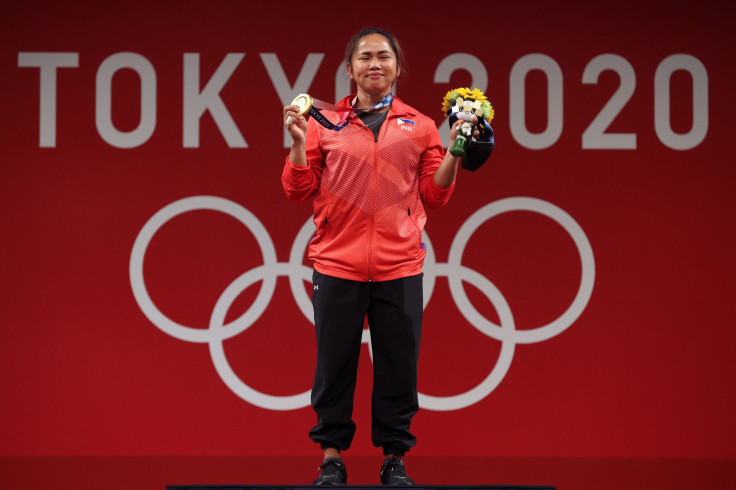Recounting Philippines' Road To Olympic Glory After Century Of Heartbreaks
KEY POINTS
- The Philippines nabbed its first-ever gold medal in the Olympics after a century of heartache
- The country had opportunities stripped away from them in the 1936 and 1996 Olympics
- Diaz had previously asked for more government funding to support her training for the 2020 Tokyo Olympics
The Philippines has appeared in every iteration of the quadrennial meet since the country first joined in 1924--except for the American-led boycott of the 1980 Moscow Olympics.
The nation’s search for that elusive Olympic gold medal finally ended after a near-century of waiting as weightlifter Hidilyn Diaz finished first in the 55-kilogram category and set an Olympic record by lifting a combined 224 kilograms across two successful lifts.
Diaz was in close competition with China’s Liao Qiuyun throughout the event, who previously held the Olympic record in that same event.
China had two top contenders in Liao Qiuyun and Li Yajun that could have both competed in that category but opted to select the then-record holder for the event due to the latter’s past mistakes while competing against Diaz in the past.
Michael “Bugs” Estipona, a CrossFit coach, took note of this and Liao's strategy of lifting relatively conservative weights in a series of tweets.
For a country that has been so in love with sports, its search for gold came close multiple times in the past.
Bill Velasco, a highly-respected sports journalist in the Philippines, wrote a Facebook post highlighting the country’s many missed opportunities at winning the gold prior to Diaz’s history-making achievement.
For most Filipinos, what they remember most is that of the 1936 Berlin Olympics and the 1996 Atlanta Olympics.
Since basketball is the most popular sport in the country, they trace their rich basketball heritage to their almost-gold medal performance in the first Olympic basketball tournament in 1936.
Velasco recounted the event leading up to the fifth-place finish of the island nation in the comments section of the aformentioned post:
- The US was allowed to field twice as many players playing as two alternating teams.
- Half the US players were above the height limit of 6’2”, with 6’8” All-American Joe Fortenberry starting at center. They should not have been allowed to play.
- On the third day (after the Islanders beat Mexico and Estonia), the tournament format was changed. Instead of double elimination, it became a knockout. Our next game was against team USA. Because of that one loss, we were relegated to the consolation bracket, when we should still have been in contention.
- Mexico, whom the Islanders had already beaten, was allowed to continue and got the bronze.
- The German organizers admitted that they were afraid of a US boycott, so they allowed the Americans to do whatever they wanted.
- The US team was not a national team, but merely a combination of the two best commercial teams in their league.
- Given that the team won its remaining games, the Philippine Islands would have finished in second place and faced the US in the final. If the US had been made to follow the rules, their players would have been playing out of position, and we would have beaten them. The rules required a jumpball after every made basket, which made the Americans’ height an insurmountable (and unfair) advantage.
Then in 1996, the Philippines had one of the clearest shots at a gold medal taken away from them as Mansueto “Onyok” Velasco fought Bulgaria’s Daniel Petrov Bojilov in the light-flyweight category.
Velasco again recalled the events leading up to Velasco's silver medal finish.
“He won the first round, but the score didn’t reflect it. They used the excuse of computer scoring, but actually, he was sacrificed to please a Bulgarian official, from what we gathered. You just need one judge to not push the button at all when you score, and you’re screwed,” the journalist mentioned.
Diaz had previously asked the Philippine government for more support as she prepared for the 2020 Tokyo Olympics following her silver medal finish at the 2016 Rio Olympics.

With the weight of a country’s hopes on her shoulders and despite the lack of sufficient funding for training, Diaz brings home the gold medal after a century of heartbreak.
© Copyright IBTimes 2024. All rights reserved.






















